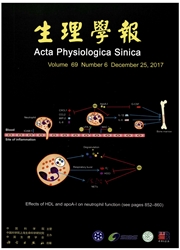

 中文摘要:
中文摘要:
高糖、高脂食物的摄取会产生奖赏效应。研究表明,高糖食物,如蔗糖或糖水的摄食经历,会影响动物对成瘾性药物的应答,但是动物对高糖食物的摄取是否影响其对成瘾性药物的觅药动机并不清楚。本研究通过自给食踏板训练使大鼠进行蔗糖摄食,并观察蔗糖自给食经历是否影响大鼠对可卡因的觅药动机。在可卡因自给药实验中,与食物对照组相比,经历蔗糖自给食的大鼠表现出较高的踏板数和摄药量、递增比率的踏板破发点以及上移的剂量反应踏板曲线,提示对可卡因觅药动机的升高;在可卡因诱导的活动敏感性实验中,经历蔗糖自给食的大鼠表现出较高的活动敏感性;在可卡因条件性位置偏爱实验和旷场实验中,经历蔗糖自给食的大鼠对可卡因配对侧的偏爱和自主活动性与食物对照组相比无显著差异;在高架十字迷宫以及条件性恐惧记忆实验中,经历蔗糖自给食的大鼠的焦虑水平以及对声音线索引起的僵直反应与食物对照组相比没有显著变化。这些结果提示,蔗糖奖赏能够增强大鼠对可卡因的觅药动机。
 英文摘要:
英文摘要:
Caloric diet, such as fat and sugar intake, has rewarding effects, and has been indicated to affect the responses to addictive substances in animal experiments. However, the possible association between sucrose reward and the motivation for addictive drugs remains to be elucidated. Thus, we carried out behavioral tests after sucrose self-administration training to determine the effects of sucrose experience on rats' motivation for cocaine, locomotor sensitivity to cocaine, basal locomotor activity, anxiety level, and associative learning ability. The sucrose-experienced(sucrose) group exhibited higher lever press, cocaine infusion and break point, as well as upshift of cocaine dose-response curve in cocaine self-administration test, as compared with the control(chow) group. Additionally, despite similar locomotor activity in open field test and comparable score in cocaine-induced conditioned place preference, the sucrose group showed higher cocaine-induced locomotor sensitivity as compared with the chow group. The anxiety level and the performance in vocal-cue induced fear memory were similar between these two groups in elevated plus maze and fear conditioning tests, respectively. Taken together, our work indicates that sucrose experience promotes the rats' motivation for cocaine.
 同期刊论文项目
同期刊论文项目
 同项目期刊论文
同项目期刊论文
 期刊信息
期刊信息
